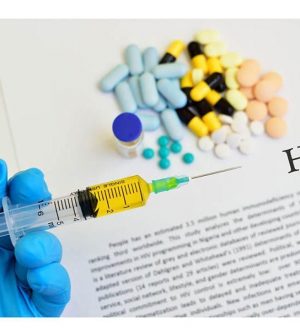- 8 Ways to Increase Dopamine Naturally
- 7 Best Breads for Maintaining Stable Blood Sugar
- Gelatin vs. Collagen: Which is Best for Skin, Nails, and Joints?
- The Long-Term Effects of Daily Turmeric Supplements on Liver Health
- Could Your Grocery Store Meat Be Causing Recurring UTIs?
- Are You Making This Expensive Thermostat Error This Winter?
- Recognizing the Signs of Hypothyroidism
- 10 Strategies to Overcome Insomnia
- Could Artificial Sweeteners Be Aging the Brain Faster?
- Techniques for Soothing Your Nervous System
COVID Vaccines Offer Good Protection for People Living With HIV

COVID-19 vaccination triggers a strong immune response in people with HIV, meaning they’re likely protected against the coronavirus, a new, small study shows.
“Previous research has suggested a suboptimal response to COVID-19 vaccines in people living with HIV; however, these studies did not fully characterize and define that response, both for cellular [where the immune system directly attacks infected cells] and humoral [where the immune system circulates virus-fighting antibodies] immunity,” said senior study author Dr. Joel Blankson. He is a professor of medicine at the Johns Hopkins University School of Medicine, in Baltimore.
“What we found with the widely used Pfizer/BioNTech vaccine was just the opposite, as it induces robust immune responses in people living with HIV, comparable to those seen in healthy people,” he explained in a Hopkins news release.
For the study, Blankson and his colleagues analyzed blood samples collected from seven women and five men with HIV and from seven women and 10 men without HIV between seven and 17 days after they received their second dose of the two-dose Pfizer vaccine.
None of the participants had evidence of prior infection with the coronavirus (SARS-CoV-2) that causes COVID-19.
All of the people with HIV were on antiretroviral therapy and had a median CD4+ T-cell count of 913 cells per microliter. Levels of these immune cells in a healthy adult are between 500 to 1,200 cells per microliter, while people with untreated HIV may have counts lower than 200 cells per microliter.
CD4+ T-cells are also called helper T-cells because they assist another type of immune cell called B-cells in responding to surface proteins (antigens) on viruses such as SARS-CoV-2, the researchers explained.
The researchers also checked for the presence and levels of antibodies against the protein making up the spikes that protrude from the surface of the coronavirus in the participants after they’d been fully vaccinated.
“We found that there was no significant difference in either the vaccine-produced CD4+ T-cell responses or the titers [levels] of SARS-CoV-2 spike binding antibodies for healthy participants and those living with HIV,” Blankson said. “This indicates that people living with HIV can be adequately protected against SARS-CoV-2, with proper vaccination.”
The study was published online recently in the journal Clinical Infectious Diseases.
Further research is needed to determine if people with HIV who have lower CD4+ T-cell counts get the same strong cellular and humoral immune responses to COVID-19 vaccines as the participants in this study, Blankson said.
More information
HIV.gov has more on COVID-19 and people with HIV.
SOURCE: Johns Hopkins Medicine, news release, Aug. 11, 2021
Source: HealthDay
Copyright © 2026 HealthDay. All rights reserved.










